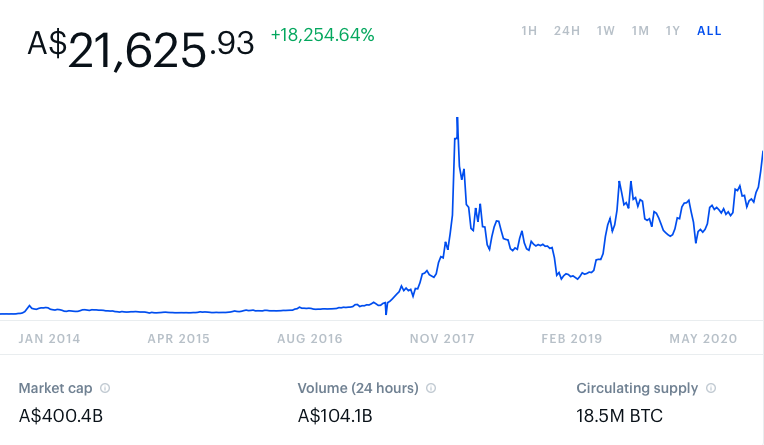Crypto survey: Trust in Bitcoin has almost overtaken banks, shares, real estate and gold

Pic: Stevica Mrdja / EyeEm / EyeEm via Getty Images
- Largest ever cryptocurrency survey reveals startling changes in society’s attitudes
- Rising level of trust in Bitcoin particularly among Millennial age group
- Bitcoin price breaches $20,000, is highest since 2018’s vertical price move
Millennials – notable early adopters of financial technology – are spearheading a change in public attitudes toward digital currencies such as Bitcoin.
This change has been captured by the largest cryptocurrency survey to date by The Tokenist news website which has shared its findings with Stockhead.
The Tokenist’s survey canvassed 5,000 people in 17 different countries in October and compared their responses to answers in a similar survey from 2017 that formed a baseline.
Full results of the survey and its analysis can be accessed at the Tokenist website.
Highest awareness and familiarity with Bitcoin is among Millennials
The survey found a very high awareness of Bitcoin at 78 per cent in Millennials, compared to 61 per cent in the survey generally.
In fact, 14 per cent or about 1:7 Millennials said they have owned Bitcoin at some point.
Millennials, or Generation Y, are aged between 25 and 39, (the 1981 to 1995 cohort). The generation is sandwiched between Generation Xers (1965 to 1980 age group, or 40 to 55), and Generation Z (10 to 24, or 1996 to 2010).
Other striking findings in the survey included 60 per cent of respondents feeling Bitcoin is a positive innovation in financial technology, up from 27 per cent three years ago.
Nearly half of survey respondents trusted Bitcoin ahead of banking institutions, up from 29 per cent three years ago.
Cryptocurrency use expected to be widespread in the 2020s
Close to 60 per cent of Millennials in the survey believe most people will be using Bitcoin in the 2020s, compared to 43 per cent of all respondents.
And, 44 per cent of Millennials said they are likely to buy Bitcoin in the next five years.
About 40 per cent of male Millennials said they were comfortable with the intangible nature of Bitcoin, and a quarter of this age group – men and women – said the same.
Only 24 per cent of Millennial respondents thought Bitcoin was in a market bubble, compared to 50 per cent of people aged more than 65 (the mostly retired age group).
Forty-five per cent of participants preferred Bitcoin over traditional investments such as shares, real estate and gold.
At the time that a similar survey was undertaken in 2017, Bitcoin prices were going parabolic and hit $26,000 in December that year.
Bitcoin prices were trading at $21,625 on Friday, and have recovered from $6,200 in mid-March, according to the Coinbase website.

Survey’s findings show rising levels of trust in Bitcoin, lower levels in banks
Tim Fries, co-founder and chief executive of The Tokenist, said he believed the survey’s results reveal some interesting findings on global sentiment toward bitcoin.
As well as revealing an increased level of trust in Bitcoin, the survey’s findings also show a growing distrust and loss of faith in governments and financial institutions.
While he did not want to speculate on any possible reasons for these findings, Fries said it may not be a coincidence that the two issues could be linked in some way in the minds of some survey respondents.
“COVID resulted in the US Federal Reserve printing trillions of dollars out of thin air, which simply cannot occur in the Bitcoin ecosystem,” Fries said.
“Rather, the creation of new Bitcoins is algorithmically defined and enforced through unalterable ‘smart contracts’,” he said.
Related Topics
UNLOCK INSIGHTS
Discover the untold stories of emerging ASX stocks.
Daily news and expert analysis, it's free to subscribe.
By proceeding, you confirm you understand that we handle personal information in accordance with our Privacy Policy.








